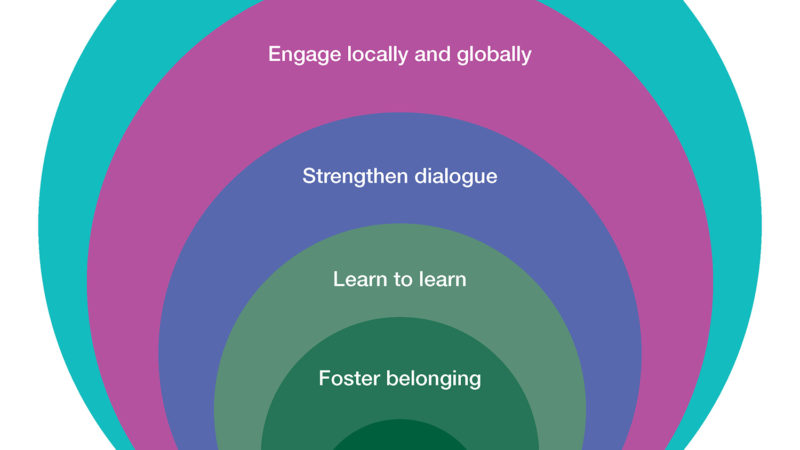It’s not all about me!
When you boil it down, what is the distilled essence of the Waynflete experience?
Who are we, what do we value, and how do we live out our values on a daily basis?
What is our core identity as a learning community?
The Waynflete faculty and administration has undertaken the task of answering those questions. While abstract to some, they are vital to those of us who work at the school and to the families who entrust their children to our care. As an independent school, Waynflete gets to choose its approach to education. Families in Southern Maine get to choose whether or not the experience we offer is right for their children.
Being a “chosen” community gives us a powerful advantage in our efforts to educate the young people in our charge. In the context of a challenging and fast-changing world, it also gives us special challenges. Since we offer a distinctive experience based on our beliefs on how best to educate youth, we need to understand what these challenges are and how they translate into best practices. And since we offer a distinctive experience, we need to be able to communicate that experience to current and future families.
To understand Waynflete’s core beliefs, one need look no further than the school’s mission statement. As we sought words to express the essence of the Waynflete experience, we settled on the third of the three broad goals of the mission statement—to encourage (in our students) responsible and caring participation in the world—as the most distilled expression of our intentions because it describes the core qualities we hope our young people will carry with them into the world beyond Waynflete.
Our next challenge was to conceptualize how the various elements of the Waynflete experience work together to encourage those core qualities. We created the diagram above to express the dynamic interrelationship of these elements as they run through all three divisions of the school. As the diagram shows, the effort to cultivate responsible and caring citizens of the world starts with valuing diversity and fostering a sense of belonging to the community by all its members. From the bedrock of a diverse and inclusive community, we can unleash our educational potential by teaching our students how to learn through a rigorous and relevant curriculum, engaging them in dialogue, and helping them enter their communities as conscientious and productive citizens.
The right words coupled with the visual go a long way toward expressing our core identity as a learning community. But to really pin it down, we needed an example. At the recent Veterans Day assembly in the upper school, Waynflete alum Josh Broder ’97, quite unknowingly, provided a great one. Rather than focusing on his personal accomplishments in the Army (which were recognized with the awarding of the Bronze Star), and as the CEO of Tilson (a Portland-based information technology company), Josh spoke about discovering that life “is not all about me” because deep personal satisfaction comes from helping the people around him succeed.
A Waynflete “lifer,” Josh described having this defining epiphany while working in the classroom, competing on sports teams, and playing in the jazz band. It soon came to guide his life. While in high school, Josh joined the youth branch of the Civil Air Patrol. In college, he enlisted in an ROTC program. Shortly after he graduated from college in the spring of 2001, he found himself deployed overseas as an Army signal officer in various theaters, including Afghanistan, where he ran the tactical communications network for U.S. forces and earned his Bronze Star.
Upon returning to civilian life, Josh fused his new knowledge of communications systems and recent experiences as a leader with his old understanding that “it’s not all about me” as the CEO of Tilson. As Josh points out in his recent TED talk, leading Tilson means much more than pursuing a livelihood; it means striving to fulfill larger social goals—in his case, to connect people and to provide the infrastructure for economic growth throughout the state and the nation.
While it was not his intention to exemplify the school’s core goal of “encouraging (in our students) responsible and caring participation in the world,” Josh managed to do just that. He even distilled the notion further into a mantra: “It’s not all about me.”
Here is Josh’s inspiring talk:



